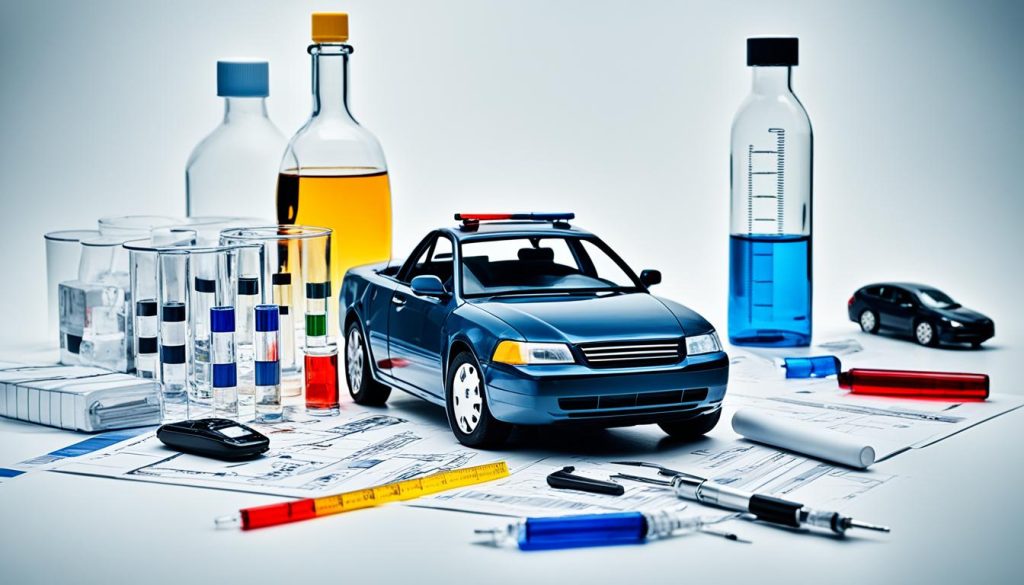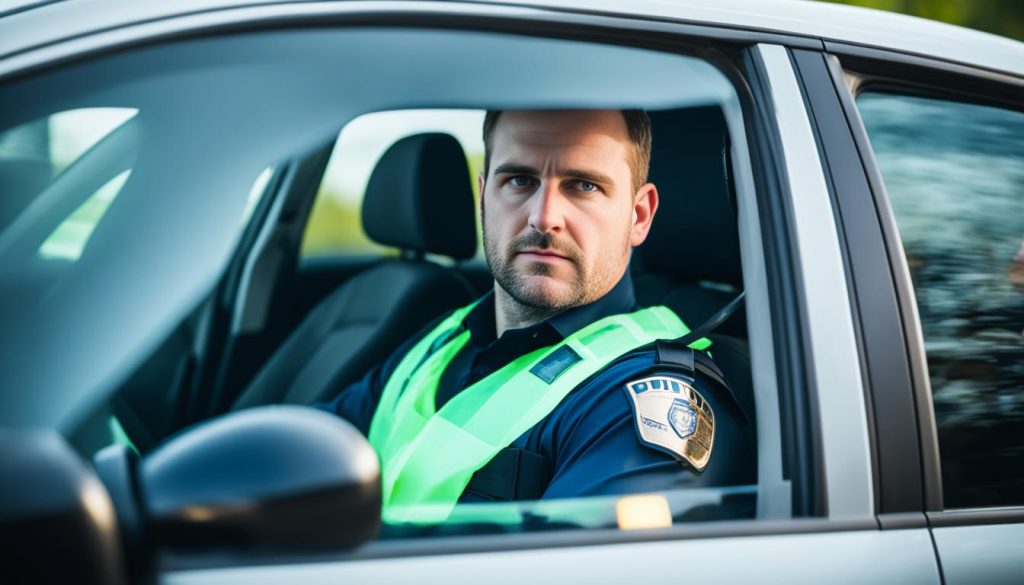Facing a DUI/DWI charge can be very stressful and change your life. But, there are ways to fight these charges. The prosecution must prove you drove and were “under the influence” or had too much alcohol or drugs1. Yet, only 35% of the time, driving patterns show if someone is drunk or drugged1.
This means the prosecution might struggle to prove you were driving. The National Highway Traffic Safety Administration (NHTSA) says driving patterns are only a clue 35% of the time1.
Also, the results of alcohol and drug tests can be questioned1. The NHTSA says Field Sobriety Tests (FSTs) are right 91% of the time under perfect conditions1. But, problems with DUI blood tests, like expired preservatives, can doubt the whole investigation1.
Another defense idea is saying your blood alcohol level was going up at the stop. This means you might not have been impaired when driving1. This idea is tricky, but a skilled DUI/DWI lawyer can look into it for you.
Key Takeaways
- The prosecution must prove you drove a vehicle and were “under the influence”
- Driving patterns are only predictive of drunk/drugged driving 35% of the time
- Field Sobriety Tests are accurate only 91% of the time in ideal conditions
- Issues with blood alcohol testing can call the entire investigation into question
- Rising blood alcohol levels can be used as a defense in DUI cases
Understanding the Prosecution’s Burden in DUI/DWI Cases
To get a DUI/DWI conviction, the prosecution must prove the defendant drove and was “under the influence.”2 But, legal standards vary a lot by state. In many places, the prosecution just needs to show the defendant had “actual physical control” of the vehicle, even if they weren’t driving2.
Challenging the “Driving” Element
One way to fight a DUI/DWI charge is to question if the defendant was actually driving2. Some states require proof of driving, but others just need proof of “actual physical control.”2 This means if someone was sleeping in the car with the keys, planning to drive later when sober2.
Also, if the police didn’t have a good reason to stop the car, the evidence against you might not be allowed2. The Supreme Court case Delaware v. Prouse said police need a valid reason to stop a vehicle, which can help your case2.
The prosecution’s job in DUI/DWI cases is complex and can be challenged by skilled defense lawyers2. Knowing the laws and past court decisions in your area is key to a strong defense.
| State | DUI/DWI Law Specifics |
|---|---|
| New York | Motorists can be convicted of DWAI (driving while ability impaired) for driving while impaired “to any extent,” while a more severe offense is a DWI (driving while intoxicated) for substantial impairment3. |
| Utah | Motorists can be convicted of a per se DUI for driving with a blood alcohol concentration (BAC) of .05% or more3. |
| Some States | DUI laws only apply to areas open to the public, requiring prosecutors to prove the roadway was accessible to the general public where the offense occurred3. |
“Challenging the accuracy of chemical test results is a common defense strategy in DUI/DWI cases, as flaws in the testing procedure or measurements can taint the results.”2
Knowing the details of your state’s DUI/DWI laws and what the prosecution must prove can help you fight the “driving” part of the case. This can protect your rights and help you get the best outcome.
Challenging Evidence of Intoxication or Impairment
In many DUI cases, the prosecution uses chemical tests and an officer’s observations to prove intoxication4. But, there are ways to question the strength of this evidence.
One way is to doubt the accuracy of alcohol or drug tests. This could be due to testing flaws or the driver’s body type4. In places like California, officers must wait before doing a breath test to see if it’s needed5. Some things like low blood sugar, certain diets, meds, or diabetes can make a person’s BAC higher, messing with breath test results5.
Another approach is to question what the officer saw during field sobriety tests4. People with bad allergies might have red, watery eyes and a red face, which could be seen as drunk5. Also, issues with how breathalyzer machines are set up can be a defense point. If the machine wasn’t set right, it could help your case5.
It’s key to remember that officers need a good reason to stop a car and strong evidence to arrest for DUI5. If they don’t have this, it could weaken the case against you.

| Key Challenges | Explanation |
|---|---|
| Accuracy of Chemical Tests | Flaws in testing procedure, unique physiology, and other factors can affect test results. |
| Officer Observations | Certain medical conditions can mimic signs of intoxication, leading to misinterpretation. |
| Breathalyzer Calibration | Improper calibration of breathalyzer machines can undermine the reliability of test results. |
| Lack of Probable Cause | Failure to meet standards for stopping a vehicle and making a DUI arrest can provide a defense. |
A good dui defense lawyer will look closely at the prosecution’s evidence and find ways to challenge it45.
“The key to a successful dui defense is to thoroughly examine the evidence and identify any weaknesses or flaws that can be used to your advantage.”
DUI defense, DWI charges, drunk driving, legal defense
Facing DUI/DWI charges can lead to serious outcomes. You might face fines, jail time, and losing your driver’s license. Repeat offenders could get even tougher penalties like ignition interlock devices6. It’s key to get a skilled DUI/DWI lawyer to look at all defense options and protect your rights6.
In many places, the legal limit for blood alcohol content (BAC) is 0.08%. Commercial drivers have a lower limit of 0.04%7. If your BAC is over 0.15%, the charges get worse. Even a little alcohol or drugs can lead to automatic DUI charges for those under 217.
DUI/DWI convictions bring big penalties, from misdemeanor charges with fines and license suspension to felony charges with jail and big fines7. A good DUI/DWI lawyer can question the accuracy of field sobriety tests and breathalyzer results. These can be wrong due to health issues, prescription drugs, or equipment problems8.
With a talented DUI/DWI lawyer, you can look at ways to lower or drop charges. This can help avoid a criminal record and lessen the effect on your life67.
“A strong attorney-client relationship in DUI/DWI cases can help in getting charges dropped or substantially reduced, avoiding a permanent criminal record.”7
Examining Police Procedures and Probable Cause
Understanding police procedures and probable cause is key in dui defense. The Fourth Amendment says officers need a good reason to stop a car and probable cause to arrest someone for DUI/DWI9. If they don’t have a valid reason, the defense might get the evidence thrown out10.
Police look for signs of impairment during a DUI/DWI check. They check for issues with how the car is driven, speed, and how the driver brakes and watches the road11. After stopping the car, they look for more signs like trouble with the car controls, slurred speech, red eyes, and the smell of alcohol11.
What the officer sees, the field sobriety tests, and the breath tests help prove probable cause for an arrest11. But the driver can refuse these tests, which might reduce the evidence against them11. A skilled dui defense lawyer can check if the stop and arrest were legal.
| Legal Standard | Requirement |
|---|---|
| Reasonable Suspicion | Factual evidence or rational inference to briefly detain someone, such as in a traffic stop10. |
| Probable Cause | Trustworthy facts to believe an individual is committing a crime, necessary for searches and arrests11. |
| Beyond a Reasonable Doubt | The high standard required to convict someone of a crime, including DUI/DWI11. |
Knowing these legal standards and the steps in a DUI/DWI check helps those charged work with their lawyer. They can spot weak points in the case and protect their rights.
“An experienced DUI defense attorney can review whether police followed legal standards like reasonable suspicion and probable cause, leading to possible charge dismissal.”10
Conclusion
Facing a DUI/DWI charge can feel overwhelming, but you might reduce or clear the charges with the right legal defense. Understanding what the prosecution must prove and questioning the evidence against you can help you. This way, you can go through the legal process and keep your rights safe12.
It’s important to know that DUI/DWI cases are a big deal for public safety. In 2019, over 10,000 people died in crashes caused by driving under the influence in the U.S12.. If you’re found guilty, you could face fines, losing your driver’s license, jail time, and having to go through alcohol education programs1213.
Getting a good outcome for your case means you need a skilled DUI/DWI lawyer. They can look at your case, question the evidence, talk about plea deals, and defend you in court13. With a talented lawyer by your side, you can handle the DUI/DWI court process well. This way, you can protect your rights, reputation, and future13.
FAQ
What are some common defenses against DUI/DWI charges?
Common defenses include questioning if you were really driving, the trustworthiness of alcohol/drug tests, and the officer’s claims of seeing you drunk. You can also challenge if the stop and arrest were legal.
Do I have to be caught driving the vehicle to be convicted of a DUI/DWI?
No, you don’t have to be driving to be convicted. Most states just need to prove you were in control of the vehicle while drunk.
How can I challenge the accuracy of chemical test results?
You can question the test results if there were mistakes in the testing or if your body reacted differently. You can also doubt the officer’s observations of how you looked and moved during tests.
What are the penalties for a DUI/DWI conviction?
A DUI/DWI conviction can lead to fines, jail, and losing your driver’s license. These penalties get worse if it’s not your first offense. Repeat offenders might also have to use ignition interlock devices.
How can police procedure impact a DUI/DWI case?
Police must have a good reason for stopping and arresting you for DUI/DWI. If they didn’t, you might get the evidence thrown out. If they didn’t warn you of your rights before questioning, any damaging statements you made could be ignored in court.

